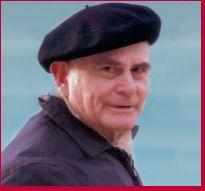During my years as a graduate composition student at the State University of New York at Stony Brook (now Stony Brook University) I studied both privately and in classes with composer John Lessard. I knew that he was called "Jack" by his friends, but he was always "Mr. Lessard" to me. There was always a level of formality that was present in our interactions, but for a period of time I worked very intensely with him and felt that our relationship went beyond the formal student/teacher type of friendship that you might have with a classroom professor.
I first met Mr. Lessard in September of 1978 during entrance exams given to all the composition students at the start of the semester. I proved to be deficient in counterpoint (among other items!) and opted to take his Tonal Counterpoint class. The course focused primarily on the Bach Inventions, and we composed two and three-part pieces in the style. He also taught Modal Counterpoint, however this was not available until the Spring 1979 semester. In the Tonal Counterpoint class there were only two students, because of this we received a lot of attention and were able to compose many two-part inventions, and then went on to compose three-part inventions and canons in the style of the Goldberg Variations. During this semester I became taken with Mr. Lessard's obvious expertise, and also his mastery of the traditional compositional disciplines: ear-training, harmony, keyboard skills, counterpoint, fugue and orchestration. He had been a student of Nadia Boulanger at the Ecole Normale de Musique in Paris before and during WWII and spoke of her often and in reverent tones. In terms of musicianship, he could sight-read in seven clefs and told me that as a young composer he regularly began his day by reading through a Haydn string quartet at the piano.

The first semester was very enjoyable, but the discipline was demanding in a way that I had not experienced before. Mr. Lessard was the first teacher who exposed me to writing a lot of examples of the same assignment and then picking the best one or two out of the pack. I enjoyed this work and felt great inspiration from studying Bach at this level of detail and imitation, and then went on to take his class in Modal Counterpoint. In contrast to Tonal Counterpoint, the modal class was based on the music of Lassus and Palestrina and Mr. Lessard felt it represented the pure study of musical lines and how they fit together, without the constraints of common-practice period harmony that became codified during Bach's lifetime. We all composed the traditional species counterpoint studies through four parts, and were working on 'mixtures' in three parts when the semester ended. I then approached him and asked if he would take me as a private student for the summer. He agreed, and we got to work on all of the topics that I just mentioned. Many lessons lasted four hours, and he would not take any payment. He also became my composition teacher in that the last items we would address in a lesson were my original works.
We experienced difficulties in our working relationship though, and I owe this to differences in our personalities and tastes, and his criticisms could have a real edge. At this point in life I view him as a tough taskmaster with strong opinions, and I was young and finding my way. At the beginning of my time with him I had been concentrating fully on my classical studies, but subsequently felt the pull of jazz very strongly and, unlike Maurice Ravel, he essentially had no respect for the music or for improvising. In large part this led to me seeking another teacher after a couple of years. We did have a reconciliation though, and this came with the performance of my Symphony in Three Parts that I had composed while studying with him. It was played by the Stony Brook Graduate Orchestra in the Spring of 1984; I was asked for program notes and chose to pay tribute and thank him for his help and guidance during the time I wrote the piece. We had a very warm conversation in the lobby at intermission, I was also happy that my piece was on a program with the Ibert Flute Concerto and the Stravinsky Symphony in C. He idolized Stravinsky and had a very strong feeling for all French music.
We went our separate ways after that time but to this day I remember things that he taught me, or said, and I can never hear the Third Invention, or the Goldberg Variations, without thinking about him.
I recently found an in-depth interview done by Chicago journalist Bruce Duffie after Mr.Lessard had retired from teaching, it vividly captures the mind of a true composer and artist.

